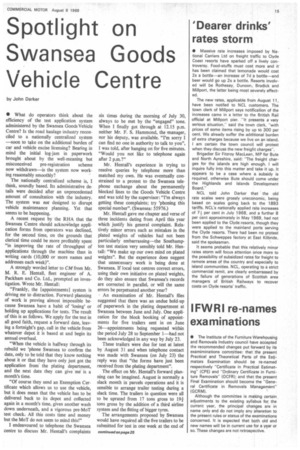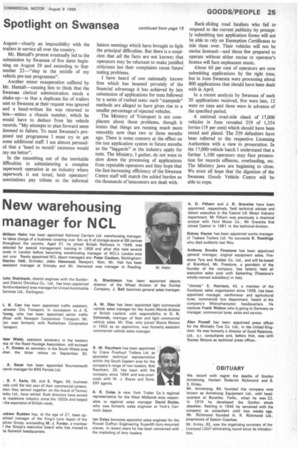Spotlight on Swansea Goods Vehicle Centre
Page 17

Page 27

If you've noticed an error in this article please click here to report it so we can fix it.
by John Darker • What do operators think about the efficiency of the test application system administered by the Swansea Goods Vehicle Centre? Is the road haulage industry recon ciled to a nationally centralized system —soon to take on the additional burden of car and vehicle excise licensing? Bearing in mind the initial log-jam in paperwork brought about by the well-meaning but misconceived pre-registration scheme now withdrawn—is the system now working reasonably smoothly?
The nationally centralized scheme is. I think, soundly based. Its administrative details were decided after an unprecedented amount of consultation with the industry. The system was not designed to disrupt vehicle maintenance planning. Yet that seems to be happening.
A recent request by the RHA that the Swansea Centre should acknowledge application forms from operators was declined, for the second time, on the grounds that clerical time could be more profitably spent -in improving the rate of throughput of applications through the machine than in writing cards (10.000 or more names and addresses each week)".
A strongly worded letter to CM from Mr. M. R. E. Hentall, fleet engineer of A. Packham and Co. Ltd., prompted an investigation. Wrote Mr. Hentall: "Frankly, the [appointments] system is driving me to distraction. Forward planning of work is proving almost impossible because Swansea have a habit of 'losing' or holding up applications for tests. The result of this is as follows. We apply for the test in all good faith, request a forward date, leaving a fortnight's gap, call in the vehicle from whatever depot it is based at and begin its annual overhaul.
"When the vehicle is halfway through its rebuild we 'phone Swansea to confirm the date, only to be told that they know nothing about it or that they have only just got the application from the plating department, and the next date they can give me is a month's time.
"Of course they send an Exemption Certificate which allows us to use the vehicle, but it does mean that the vehicle has to be delivered back to its depot and collected again in a month's time, given another wash down underneath, and a vigorous pre-MoT test check. All this costs time and money but the MoT do not seem to mind this!"
I endeavoured. to telephone the Swansea centre to discuss Mr. Hentall's complaints
six times during the morning of July 30, always to be met by the "engaged" tone. When I finally got through at 12.15 p.m. neither Mr. F. S. Hammond, the manager, nor his deputy, was available. "I'm sorry I can find no one in authority to talk to you", I was told, after hanging on for five minutes. "Would you not like to telephone again after 2 p.m.?"
Mr. Hentall's experience in trying to resolve queries by telephone more than matched my own. He was eventually constrained to a protest to the Swansea telephone exchange about the permanently blocked lines to the Goods Vehicle Centre and was told by the supervisor: "I'm always getting these complaints; try 'phoning this special number". (Swansea: 55976.)
Mr. Hentall gave me chapter and verse of three incidents dating from April this year which justify his general complaint. Relatively minor errors such as mistakes in the plated weights of vehicles had not been particularly embarrassing—the Southampton test station very sensibly told Mr. Hentall: "We make up our own mind on plated weights". But the experience does suggest that unnecessary work is being done at Swansea. If local test centres correct errors. using their own initiative on plated weights. do they also ensure that Swansea's records are corrected in parallel, or will the same errors be perpetuated another year?
An examination of Mr. Hentall's files suggested that there was an undue hold-up of paperwork in the plating department at Swansea between June and July. One application for the block booking of appointments for five trailers sent in on June 26—appointments being requested within the period July 28 to September 1—had not been acknowledged in any way by July 23.
These trailers were due for test at latest by August 31 and when telephone contact was made with Swansea (on July 23) the reply was that "the forms have just been received from the plating department".
The effect on Mr. Hentall's forward planning can be imagined. August is normally a slack month in parcels operations and it is sensible to arrange trailer testing during a slack time. The trailers in question were all to be uprated from 17 tons gross to 19f tons gross by the addition of a third airline system and the fitting of bigger tyres.
The arrangements proposed by Swansea would have required all the five trailers to be submitted for test in one week at the end of continued on page 25 August—clearly an impossibility with the trailers in service all over the country.
Mr. Hentall's protest eventually led to the submission by Swansea of five dates beginning on August 29 and extending to September 22—"slap in the middle of my vehicle pre-test programme".
Another minor exasperation suffered by Mr. Hentall—causing him to think that the Swansea clerical administration needs a shake-up--is that a duplicate list of trailers sent to Swansea at their request was ignored and a hand-written list was returned to him—minus a chassis number, which he would have to deduce from his vehicle records. "My attempts to plan forward seem doomed to failure. To meet Swansea's proposed test programme I must try to get some additional staff. I am almost persuad:d that a 'hand to mouth' existence would lay me better".
In the smoothing out of the inevitable Efficulties in administering a complex 3aperwork operation in an industry where mperwork is not loved, both operators' issociations pay tribute to the informal
liaison meetings which have brought to light the principal difficulties. But there is a suspicion that all the facts are not known; that operators may be reluctant to make justified, criticisms lest their complaints cause future testing problems.
I have heard of one nationally known firm which has boasted privately of the financial advantage it has achieved by late submission of applications for tests followed by a series of rushed tests: such "stampede" methods are alleged to have given rise to a smaller percentage of rejected vehicles.
The Ministry of Transport is not complacent about these problems, though it insists that things are running much more smoothly now than two or three months ago. There is some concern at the effect on the test application system in future months as the "laggards" in the industry apply for tests. The Ministry, I gather, do not want to slow down the processing of applications from reputable operators and they hope that the fast-increasing efficiency of the Swansea Centre staff will match the added burden as the thousands of latecomers are dealt with. Back-sliding road hauliers who fail to respond to the current publicity by promptly submitting test application forms will not be able to rely on Exemption Certificates to tide them over. Their vehicles will not be excise licensed—and those few prepared to operate without either excise or operator's licence will face unpleasant music.
About 60 per cent of operators are now submitting applications by the right time, but in June Swansea were processing about 800 applications that should have been dealt with in April.
In a recent analysis by Swansea of each 20 applications received, five were late. 12 were on time and three were in advance of the specified period.
A national road-side check of 17,000 vehicles in June revealed 259 of 1,354 lorries (19 per cent) which should have been tested and plated. The 259 defaulters have been referred to the respective Licensing Authorities with a view to prosecution. In the 17,000-vehicle batch 1 understand that a further 1,100 operators may face prosecution for records offences, overloading, etc. The Ministry jaws are beginning to close. We must all hope that the digestion of the Swansea Goods Vehicle Centre will be able to cope.




































































































